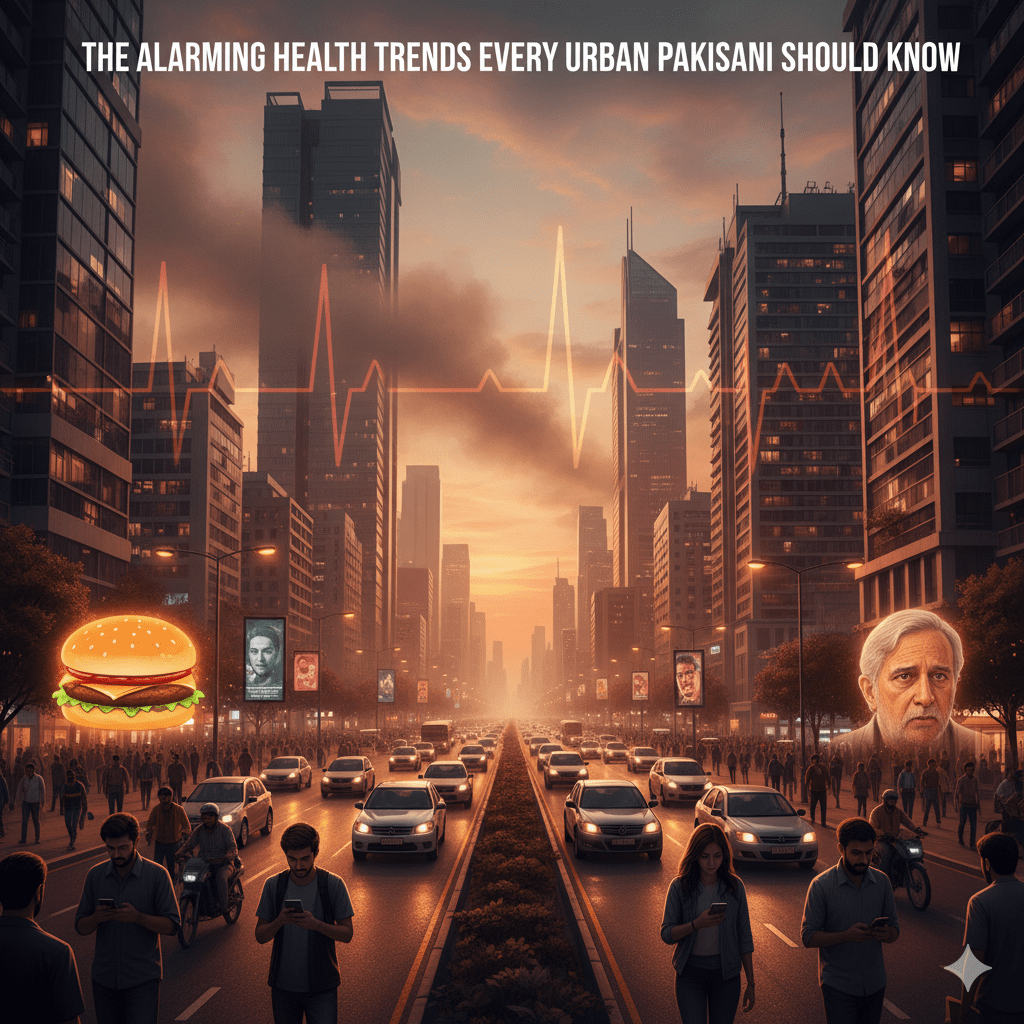
Alarming Health Trends Every Urban Pakistani
Life in Pakistan’s major cities, Karachi, Lahore, Islamabad, and others, has changed rapidly in the past decade. With more people moving to cities for work, education, and better lifestyles, urban living has become the new norm. But behind the fast-paced city life lies a growing health crisis that most people are unaware of. From poor diets to rising mental health issues, urban Pakistanis are facing health trends that could shape the nation’s future if not addressed soon.
1. The Silent Rise of Lifestyle Diseases
One of the most concerning trends in urban Pakistan is the sharp increase in lifestyle-related diseases. Conditions like diabetes, hypertension (high blood pressure), and heart disease, once considered “old age” problems, are now affecting younger people. The main culprits? Sedentary lifestyles, processed foods, and a lack of physical activity.
Fast food chains are everywhere, offering convenience but at the cost of health. Most urban professionals skip home-cooked meals for high-calorie options loaded with unhealthy fats and sugar. Combined with long office hours and little exercise, this lifestyle leads to obesity and insulin resistance, two early indicators of chronic illness.
According to local health surveys, one in four urban Pakistanis is either diabetic or pre-diabetic. This trend is not only alarming but also points to a future where healthcare systems will be under immense pressure.
2. Air Pollution and Respiratory Illnesses
Air quality in major Pakistani cities is deteriorating every year. Lahore, for instance, frequently ranks among the most polluted cities in the world during the winter months. The thick smog that blankets the city is not just an inconvenience, it’s a serious health hazard.
Continuous exposure to polluted air can lead to asthma, chronic bronchitis, and even long-term lung damage. Children and the elderly are especially vulnerable, as their lungs are more sensitive to harmful particles in the air.
Doctors are reporting more cases of respiratory infections and allergies than ever before. Many people complain of constant coughing, headaches, and fatigue without realizing that the air they breathe daily is the main cause. Unless stricter environmental policies are implemented, this health trend will continue to worsen.
3. The Growing Burden of Mental Health Issues
Urban life brings opportunities but also stress. The constant race to earn more, do more, and be more is taking a toll on people’s mental well-being. Anxiety, depression, and burnout are becoming increasingly common, especially among young adults.
Unfortunately, mental health is still a taboo topic in many Pakistani households. People often dismiss emotional distress as weakness or overthinking. As a result, many suffer silently, unable to seek the help they need.
Workplace pressure, financial instability, social comparison, and digital overload (from social media) have made it harder for people to find peace of mind. Mental health experts warn that unless this issue is addressed openly, it could lead to long-term social and health problems such as substance abuse, relationship breakdowns, and chronic stress disorders.
4. Poor Nutrition Despite Easy Access to Food
It may sound ironic, but malnutrition is now common in urban areas not because of food shortage, but because of poor dietary choices. Many city dwellers rely heavily on processed and packaged foods that are rich in calories but low in nutrients.
Vitamin D deficiency, anemia, and calcium imbalance are increasingly being reported among adults and even children. Skipping breakfast, eating late dinners, and consuming sugary snacks have become normal habits, leading to weak immunity and fatigue.
Urban Pakistanis also face a major hydration issue many people simply don’t drink enough water. Replacing water with tea, coffee, or soft drinks is becoming a dangerous trend that silently affects kidney and liver health.
5. Lack of Regular Health Checkups
Another alarming health trend is the neglect of preventive care. Most people in Pakistan visit doctors only when they feel seriously ill. Regular medical checkups, which can detect diseases early, are often ignored.
For instance, a simple blood test can reveal early signs of diabetes, cholesterol imbalance, or thyroid problems but few people bother to get tested until symptoms appear. This delay often leads to more complicated and expensive treatments later on.
Health experts recommend routine checkups at least once a year. Services like online lab bookings and telemedicine have made this easier than ever, yet awareness and habit are still lacking.
6. Sedentary Lifestyle and Lack of Exercise
Technology has made life easier but also less active. Many urban Pakistanis spend hours sitting at desks, using computers, or scrolling through their phones. Even leisure time often involves watching TV or using social media rather than physical activity.
This lack of movement affects posture, metabolism, and mental health. It also contributes to obesity and musculoskeletal issues like back and neck pain. The World Health Organization (WHO) recommends at least 150 minutes of moderate physical activity per week, but very few people meet this target.
Small lifestyle changes like walking instead of driving short distances, using stairs, or joining a fitness class can make a big difference.
7. Digital Fatigue and Sleep Deprivation
Urban lifestyles are increasingly dominated by screens. From smartphones and laptops to television, digital exposure has reached unhealthy levels. Late-night scrolling and binge-watching not only affect sleep but also disrupt the body’s natural rhythm.
Poor sleep leads to weakened immunity, poor concentration, and higher stress levels. The average urban Pakistani sleeps far less than the recommended 7–8 hours a night, contributing to long-term fatigue and poor productivity.
Practicing digital detox, reducing screen time before bed, and maintaining a regular sleep schedule can help restore balance.
Instant lab booking at Chughtai Lab via Instacare
Conclusion: Building a Healthier Urban Future
The health challenges facing urban Pakistanis are serious but not irreversible. Awareness is the first step toward change. By making small but consistent lifestyle adjustments like eating balanced meals, exercising regularly, taking mental health seriously, and scheduling annual checkups, urban residents can protect their well-being.
Cities may never slow down, but individuals can choose to live mindfully within them. The future of urban Pakistan depends not just on economic growth, but on the health and resilience of its people. Taking care of your body and mind today is the smartest investment for tomorrow.

